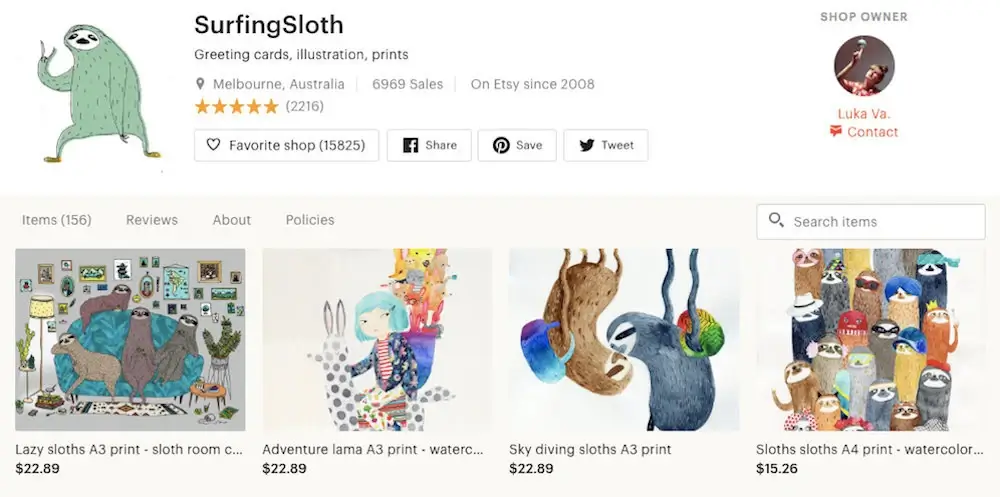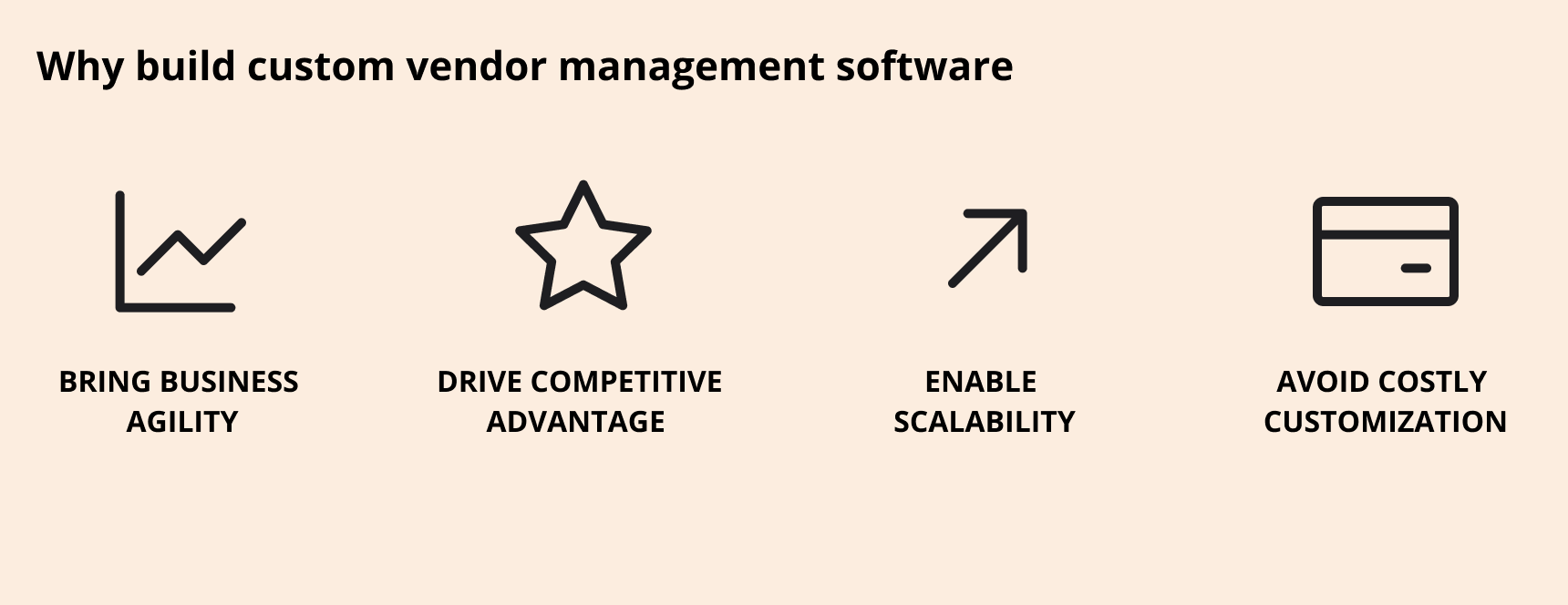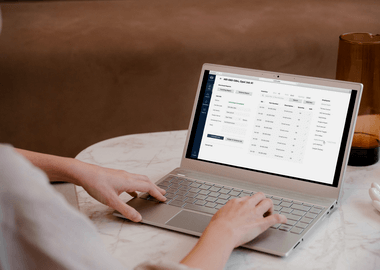Vendor Management Portal: Types, Features, and Benefits for Business
Efficient vendor management is crucial for business stability and growth. Modern e-commerce is fast-paced and innovative, requiring companies to constantly improve to remain competitive. A vendor management portal is an indispensable tool for achieving these criteria.
In this article, we’re exploring vendor portals — what they do, the different types out there, and how they can benefit your business. Let’s get right to it.
A vendor portal, also called a supplier portal, is an online tool that helps businesses work with their suppliers more easily. It takes the hassle out of manual tasks by automating things like purchase orders, invoice processing, and onboarding. That’s basically what a supplier management portal is — a simple way to keep vendor relationships organized and running smoothly.
By cutting down on tedious work and reducing mistakes, these portals save time, lower costs, and make everything flow better between buyers and suppliers.
Effective supplier management requires using the proper vendor management software, as there are different types of applications for B2B and B2C transactions.
B2B portals
Business-to-business vendor portals help companies manage relationships with their direct and third-party suppliers. These platforms handle essential tasks like procurement, order tracking, compliance, and document management. By automating these processes, businesses can reduce manual work, minimize errors, and improve overall efficiency.
Main characteristics of a B2B vendor portal:
- Supply chain management. Tracks shipments, inventory, and deliveries to ensure smooth operations.
- Procurement processes. Automates purchase orders, approvals, and payments to speed up transactions.
- Collaboration tools. Provides messaging, file sharing, and task management to keep buyers and suppliers aligned.
- Integration with enterprise systems. Connects with ERP, CRM, and accounting software to sync data and reduce duplicate work.
- Security features.. Uses encryption, role-based access, and authentication to protect sensitive supplier and transaction data.
- Customizable dashboards.. Displays real-time data on order status, spending, and vendor performance for better decision-making.
Example of a B2B portal:
Any well-known marketplace that connects businesses with suppliers is a B2B portal. Think Alibaba, Amazon Business, or eBay Business Supply — they all help companies find and buy what they need. But there are also more industry-specific portals, like ThomasNet for industrial supplies, Digi-Key for electronic components, and Global Sources for specialized sourcing.
These platforms make it easier for businesses to find the right suppliers, manage purchases, and compare options. Instead of chasing down vendors one by one, companies can handle everything in one place, saving time and keeping their supply chain running smoothly.

Image credit: Amazon Business
B2C portals
Business-to-consumer vendor portals are designed for companies that sell directly to individual customers. These platforms are typically eCommerce websites or online marketplaces where vendors list their products, manage orders, and handle customer interactions. Unlike B2B portals, which focus on bulk transactions and supplier management, B2C portals prioritize customer experience, fast transactions, and seamless order fulfillment.
Main characteristics of B2C portals:
- Online storefronts. Vendors can create and manage product listings with images, descriptions, and pricing.
- Order processing. Automates order placement, payment collection, and delivery tracking.
- Customer interaction. Includes reviews, chat support, and personalized recommendations to customize and improve the shopping experience.
- Marketing and promotions. Offers discount codes, loyalty programs, and advertising tools to attract customers.
- Secure payment systems. Supports various payment methods with encryption and fraud protection.
- Customizable dashboards.. Displays real-time data on order status, spending, and vendor performance for better decision-making.
Example of a B2C portal:
A well-known example of a B2C portal is Amazon, where individual consumers buy products directly from sellers. Other B2C vendor portal examples include Etsy, which specializes in handmade and unique items, and eBay, which allows businesses and individuals to sell new or used goods.
These platforms make it easy for vendors to reach customers, process orders efficiently, and grow their businesses without needing a physical store.

Image credit: Etsy
Looking to improve operations and cut costs?
Digiteum can digitize your business with custom vendor portal development and integration.
Contact usThe capabilities of a vendor portal depend on the features included in your software. While there are many possibilities to integrate different functions into your vendor item portal, here are the most important features that must be present in any application.

Vendor onboarding and account
Vendors must be able to register their profiles in the system. A full-function vendor portal should provide a user-friendly registration process that is simple and intuitive. Merchants should be able to add detailed and relevant information about their company and items.
Key features:
- User-friendly forms that are designed to minimize errors and make the registration easy
- Validation and verification to check data accuracy and ensure the contact details are correct
- Document upload for suppliers to provide licenses or certifications
- Review and approval workflow with multiple stages from document submission to approval
Profile management
Profile management includes the roles and permissions for different people within an organization to manage the profile. For example, the profile owner can have full administration rights, while another person added to the profile can only add and manage products and services. It’s also necessary to include the possibility to update profile information to ensure it’s accurate and up-to-date.
Key features:
- Editable profiles to change contact information, product or service listings, pricing, and more
- Version control to ensure businesses can track changes over time and revert them if needed
- Role-based permissions to control who can edit specific sections of a supplier’s profile
- Notifications and reminders for suppliers and administrators regarding changes or events
Document management
The importance of a vendor portal also lies in its document management capabilities, as it enables secure storage, retrieval, and sharing of essential documents between businesses and their suppliers. This is vital for industries with significant regulatory requirements where companies need multiple licenses and certifications.
Key features:
- Secure storage to ensure sensitive information is protected by encryption
- Categories and filters by type, date, or other criteria to find documents quickly and easily
- Version control to see changes in documents and update them
- Notifications to alert users about document updates when one is uploaded or modified
Order and delivery management
Tracking order and delivery statuses in real-time is necessary to monitor procurement operations and enable supply chain continuity. This requires the integration of many features to get updates on the data automatically.
Key features:
- Tracking dashboard to see the status of requests, orders, and deliveries in a user-friendly format
- Alerts and notifications to inform suppliers and buyers about changes in order status, new requests for quotes, delays, etc.
- Integration with ERP and third-party systems for inventory management, shipping, or other supply chain management tools
- Reporting and analytics to help users analyze the performance of their leads and deliveries, enabling data-driven decision-making
Communication
Effective communication is critical in vendor management as it’s the main source for sales and collaboration. One of the biggest benefits of a supplier portal is that all communication can occur within a single platform without needing external software.
Key features:
- Messaging system to enable secure and real-time communication between parties
- File sharing that allows parties to exchange documents, purchase orders, invoices, and other files in the portal
- Collaboration tools such as task management or shared calendars to facilitate joint projects
- Mobile accessibility to ensure it’s possible to communicate while away from the PC
Integration with business systems
A good vendor portal doesn’t work alone — it needs to sync up with other business systems. This helps avoid extra manual work and makes sure data flows smoothly. In the end, integrating with the right tools reduces errors and boosts productivity.
Key features:
- ERP and accounting software integration to sync vendor transactions, invoices, and financial data
- Supply chain management system connections for better tracking of procurement and inventory
- CRM integration to maintain supplier relationships and streamline communication
- API access to allow custom connections with other business applications
While the benefits of a vendor portal may differ from one business to another, here are the main ones that apply to most situations:

Optimize sales cycle
One of the crucial vendor portal advantages is the reduced time to sale. It eliminates human interaction and automates order placement, making all processes a matter of clicks. This leads to reduced operational costs and improved client-vendor interaction.
Enable easy vendor onboarding
Another important option among the vendor portal benefits is the simplified vendor onboarding. A well-designed system makes it easy to begin collaboration, create a profile, upload all necessary documents, and start working.
Simplify vendor management
Build a feature-rich vendor portal to easily scale your vendor portfolio and make a resilient supply chain.
Show web portal servicesMinimize risk of fraud
Transparency and document management minimize the risk of fraudulent activities in vendor-supplier relationships. This is crucial for maintaining trust and integrity in business interactions.
Maximize compliance
Many industry regulations and internal policies require companies to comply to conduct business. Vendor portals help ensure all transactions and interactions align with compliance standards.
Reduce costs
Vendor portals significantly reduce operational costs by automating manual processes and improving efficiency. This includes savings on labor costs, cutting procurement expenses, and mitigating errors and supply chain disruptions.
Data-driven decision making
Vendor portals give you useful insights with reports and data. This helps businesses make smarter decisions, improve their supply chains, and manage vendor performance better. By looking at the data, companies can spot trends, predict what’s coming next, and adjust their plans accordingly.
The decision depends on your requirements, available resources, and long-term goals.
Platform-based portals are usually the best choice for companies who want to solve standard vendor management tasks quickly and cost-effectively. However, these companies lose personalization and scalability as they are limited to their provider’s offers.
Choose a platform-based portal when:
- You need a quick and easy setup.
- You want a cost-effective solution for basic vendor management tasks.
- Standard features like invoicing and order tracking are enough.
- You prefer ready-made integrations with your existing tools.
Developing a custom vendor portal is a better choice for companies looking for a scalable solution that fits the unique requirements and workflows of their business.
A custom-built portal can help you if:
- You need a solution that fits your specific workflows and business processes.
- Flexibility and scalability are key as your needs grow.
- You want seamless integration with your existing systems.
- You’re looking for long-term cost savings with no licensing fees or forced upgrades.

Digiteum is your trusted tech partner in creating effective vendor management solution tailored to the unique needs of your business and customers. With over a decade of experience in building web systems, we will help you design and develop a feature-rich vendor portal and seamlessly integrate it into your operations. All that in line with your budget and delivery goals.
Contact our team to access:
- End-to-end web portal development services, including scoping and discovery, UX/UI design, development, deployment, and management.
- Senior design and engineering teams with experience in your industry and strong focus on building value-driven solutions
- Rich tech stack including .NET, Java, Angular, React, Python, Node.js, AWS, Google Cloud, Microsoft Azure, and more.
- Proven track record of successful deliveries and long-term partnerships with such companies as Oxford University Press, Adorama Camera, Lodgify, Origin Digital, Oracle UK, and more.
- Guaranteed quality of ISO-certified services and delivery practices (ISO 27001, ISO 9001).
Quick wrap-up
In this post, we have reviewed what a supplier management portal is and how it benefits your business. This is an invaluable asset that will enable you to enhance supplier relationships, streamline operations, and reduce expenses. Opting for a custom-built portal will help you drive automation and efficiency into your procurement and vendor management process without compromising your requirements and cutting off valuable features.
This post was originally published on October 27, 2023, and updated on March 5, 2025.
You are one step away from seamless vendor management
Simplify vendor management and procurement operations with a powerful vendor portal.
HIRE PORTAL DEVELOPERS






